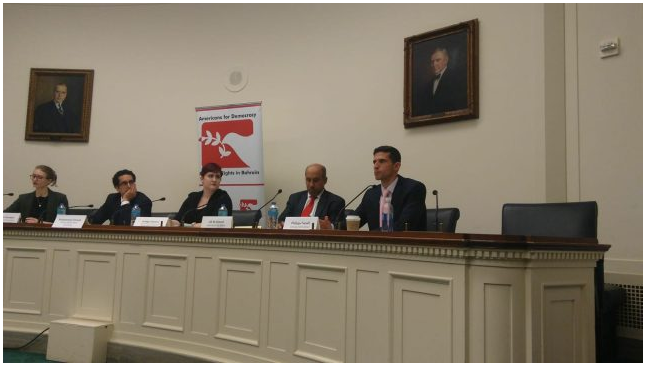ADHRB’s Conference in Systematic Rights Violations in Yemen
YemenExtra
SH.A.
Americans for Democracy & Human Rights in Bahrain (ADHRB) hosted an event in Congress on the human rights situation in Yemen. The event, moderated by Bridget Quitter of ADHRB, featured expert panelists including Mohammad Alwazir of the Arabian Rights Watch Association (ARWA), Ali Al-Ahmed of the Institute for Gulf Affairs, Laura Neumayer of ADHRB, and Philippe Nassif of Amnesty International.
Quitter began the event with a short opening statement and introduction of the panelists and the topics of their remarks. She referenced the ongoing human rights abuses in Yemen, and the need for reform and action on these issues.
In her speech, Laura Nimier of ADHRB talked around accountability for systematic human rights violations perpetrated in Yemen, explaining that, sovereign state actors engaging in coalition efforts are obligated to uphold international human rights and humanitarian standards in their operations. Neumayer explained the array of rights violations perpetrated by coalition members, ranging from reports of abysmal prison conditions and abuse from UAE-run prisons, indiscriminate airstrikes on civilians and critical infrastructure and the targeting of human rights defenders and journalists with a great lack of accountability. Concerns surrounding these violations and impunity have been raised by the Group of Eminent Experts (GEE) on Yemen, Human Rights Watch, Amnesty International, Doctors Without Borders, and others.
Laura Nimier added, it was important for policymakers in the United States to demand that sovereign actors such as Saudi Arabia and the UAE committed violations of rights in its aggression against Yemen. On the other hand, Bahrain and Saudi Arabia continue to suppress the opposition, for example the arrest of political activists Ibrahim Sharif and Ali al-Ashiri, who criticized the policies of the government and its allies.
Mohammad Alwazir called on the United States to stop its support for the Saudi-UAE alliance for aggression against Yemen, saying there was no justified support for the war and the humanitarian crisis in Yemen, which led to the disruption of the social fabric and serious violations of human rights.
Ali Al-Ahmad of the Institute of Gulf Affairs (Persian) said that the launched into a discussion of the western and international media’s unwillingness to confront the Gulf States on the atrocities they are carrying out daily in Yemen. By failing to “call a spade a spade”, referring to rhetorical dodging such as the reference of Saudi airstrikes as explosions, media outlets have failed the international community and the Yemeni people.
Saudi attempts to isolate and destroy Yemen’s ability to resist was referenced as a colonial effort by Saudi Arabia designed to secure Yemen’s resources and ensure its dependence on Saudi Arabia. To bolster his point on Saudi imperialism in the Gulf, Al-Ahmed cited the diplomatic embargo against Qatar, a ploy he said was designed to isolate the country and its massive petrol reserves.
Al-Ahmed called on the international media to emphasize Saudi Arabia’s attempts to spread its influence as well as Saudi airstrikes that deliberately target civilians–a clear violation of international law. He argued that the Saudis are in possession of precision guided weapons and sophisticated radar equipment that allows them to precisely target objectives for airstrikes, indicating no excuse for the number of civilian casualties or the degree of destruction of infrastructure occurring.
Al-Ahmed provided further context for neglect to the crisis in Yemen, citing that the World Health Organization had stopped delivering vaccines to Yemen following a large Saudi donation, under reporting from the UN regarding the civilian death toll in Yemen, and that few protests were occurring against western involvement in the worst humanitarian crisis in the world. The ongoing war in Yemen will likely continue unless there is significant international action to pressure all parties to come to a peace agreement.
A member of the Tom Lantos Human Rights Committee in Congress asked a question during the event about one of the reasons for Bahrain’s imprisonment of human rights defender Nabeel Rajab, who was critical of the attack on Yemen, he was sentenced to five years.
In March 2015, the US_Saudi coalition started a war against Yemen with the declared aim of crushing the Yemeni Houthis (Ansarullah), who had taken over from the staunch Riyadh ally and fugitive former president Abd Rabbuh Mansur Hadi, while also seeking to secure the Saudi border with its southern neighbor.
Despite the coalition claims that it is bombing the positions of Ansarullah, Saudi bombers are flattening residential areas and civilian infrastructures.
Four years and over 600,000 dead and injured Yemeni people and prevented the patients from travelling abroad for treatment and blocked the entry of medicine into the war-torn country, the war has yielded little to that effect.

